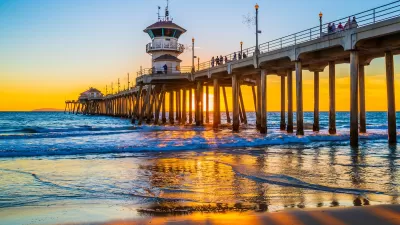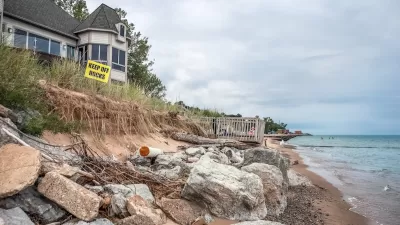Rising sea levels caused by global climate change are predicted to swallow the country of Bangladesh by the end of the century.
"The International Panel on Climate Change (IPCC) – whose predictions have consistently turned out to be underestimates – said that Bangladesh is on course to lose 17 per cent of its land and 30 per cent of its food production by 2050. For America, this would be equivalent to California and New York State drowning, and the entire mid-West turning salty and barren."
"Surely this couldn't be right? How could more than 20 million Bangladeshis be turned into refugees so suddenly and so silently? I dug deeper, hoping it would be disproved – and found that many climatologists think the IPCC is way too optimistic about Bangladesh. I turned to Professor James Hansen, the director of Nasa's Goddard Institute for Space Studies, whose climate calculations have proved to be more accurate than anybody else's. He believes the melting of the Greenland ice cap being picked up by his satellites today, now, suggests we are facing a 25-metre rise in sea levels this century – which would drown Bangladesh entirely."
"Dr Atiq Rahman's office in downtown Dhaka is a nest of scientific reports and books that, at every question, he dives into to reel off figures. He is a tidy, grey-moustached man who speaks English very fast, as if he is running out of time."
"'This is the ground zero of global warming.' He listed the effects. The seas are rising, so land is being claimed from the outside. (The largest island in the country, Bhola, has lost half its land in the past decade.) The rivers are super-charged, becoming wider and wider, so land is being claimed from within. (Erosion is up by 40 per cent). Cyclones are becoming more intense and more violent (2007 was the worst year on record for intense hurricanes here). And salt water is rendering the land barren. (The rate of saline inundation has trebled in the past 20 years.) 'There is no question,' Dr Rahman said, 'that this is being caused primarily by human action. This is way outside natural variation. If you really want people in the West to understand the effect they are having here, it's simple. From now on, we need to have a system where for every 10,000 tons of carbon you emit, you have to take a Bangladeshi family to live with you. It is your responsibility.' In the past, he has called it 'climatic genocide'."
FULL STORY: Bangladesh set to disappear under the waves by the end of the century

Planetizen Federal Action Tracker
A weekly monitor of how Trump’s orders and actions are impacting planners and planning in America.

Maui's Vacation Rental Debate Turns Ugly
Verbal attacks, misinformation campaigns and fistfights plague a high-stakes debate to convert thousands of vacation rentals into long-term housing.

San Francisco Suspends Traffic Calming Amidst Record Deaths
Citing “a challenging fiscal landscape,” the city will cease the program on the heels of 42 traffic deaths, including 24 pedestrians.

Amtrak Rolls Out New Orleans to Alabama “Mardi Gras” Train
The new service will operate morning and evening departures between Mobile and New Orleans.

The Subversive Car-Free Guide to Trump's Great American Road Trip
Car-free ways to access Chicagoland’s best tourist attractions.

San Antonio and Austin are Fusing Into one Massive Megaregion
The region spanning the two central Texas cities is growing fast, posing challenges for local infrastructure and water supplies.
Urban Design for Planners 1: Software Tools
This six-course series explores essential urban design concepts using open source software and equips planners with the tools they need to participate fully in the urban design process.
Planning for Universal Design
Learn the tools for implementing Universal Design in planning regulations.
Heyer Gruel & Associates PA
JM Goldson LLC
Custer County Colorado
City of Camden Redevelopment Agency
City of Astoria
Transportation Research & Education Center (TREC) at Portland State University
Jefferson Parish Government
Camden Redevelopment Agency
City of Claremont





























